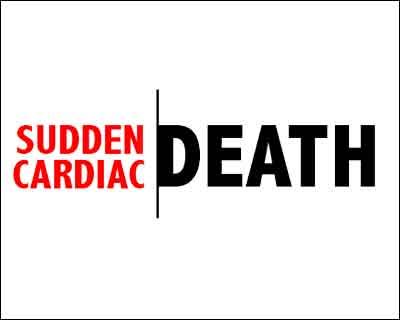- Home
- Editorial
- News
- Practice Guidelines
- Anesthesiology Guidelines
- Cancer Guidelines
- Cardiac Sciences Guidelines
- Critical Care Guidelines
- Dentistry Guidelines
- Dermatology Guidelines
- Diabetes and Endo Guidelines
- Diagnostics Guidelines
- ENT Guidelines
- Featured Practice Guidelines
- Gastroenterology Guidelines
- Geriatrics Guidelines
- Medicine Guidelines
- Nephrology Guidelines
- Neurosciences Guidelines
- Obs and Gynae Guidelines
- Ophthalmology Guidelines
- Orthopaedics Guidelines
- Paediatrics Guidelines
- Psychiatry Guidelines
- Pulmonology Guidelines
- Radiology Guidelines
- Surgery Guidelines
- Urology Guidelines
Higher thyroid hormone levels linked to sudden cardiac death : AHA Study

Study Highlights: The risk of sudden cardiac death was significantly greater in patients with thyroid hormone levels at the higher end of normal, compared to patients with levels at the low end. These findings suggest that thyroid hormone levels could ...
Study Highlights
- The risk of sudden cardiac death was significantly greater in patients with thyroid hormone levels at the higher end of normal, compared to patients with levels at the low end.
- These findings suggest that thyroid hormone levels could help identify patients at risk for sudden cardiac death, although further research is needed.
- Researchers suggest healthcare providers be cautious when treating low thyroid hormone so that thyroid levels are not over treated.
Dallas : Risk of death from a sudden loss of heart function was significantly greater in patients with thyroid hormone levels at the higher end of normal range, compared to patients with levels at the lower end, according to new research in the American Heart Association’s journal Circulation.
Sudden cardiac death, occurs when the heart’s normal electrical rhythm malfunctions, causing the heart to stop beating. According to a 2012 Circulation study, more than half of all cardiovascular deaths stem from sudden cardiac death, and in many instances no previous symptoms of heart disease were apparent.
“Currently, we do not have a good way to predict sudden cardiac death in the general population,” said Layal Chaker, M.D., M.Sc., study lead author and doctoral candidate and research fellow in endocrinology and epidemiology at Erasmus University Medical Center Rotterdam in the Netherlands. “Thus identifying additional risk factors is crucial. Our results indicate that thyroid hormone levels may be useful for assessing risk to prevent sudden cardiac death.”
Thyroid hormone is made in the thyroid gland and circulates in the blood to help regulate nearly all of the body’s organs, including the heart. Although the link between abnormal levels of thyroid hormone and cardiovascular disease is well established, the hormone’s relationship with sudden cardiac death is unclear.
Researchers analyzed 10,318 patients in the Rotterdam Study, which is a long-term investigation of heart and other chronic disease among the middle-aged and elderly in the Netherlands. Participants’ average age was 65, more than half were women, and nearly all were Caucasian.
Researchers linked the association of thyroid-stimulating hormone and free thyroxine thyroid hormone levels in blood samples with sudden cardiac deaths listed on medical records and death certificates. During an average follow-up of nine years they found:
- Participants with free thyroxine hormone levels at the high end of the normal range were 2.5 times more likely to die of sudden cardiac death, compared to patients with levels at the lower end.
- The ten-year risk of sudden cardiac death was four times greater among patients with higher free thyroxine levels compared to those with lower levels 4 percent versus 1 percent.
- The increased risk persisted even after controlling for other risk factors, such as high cholesterol and high blood pressure.
- 261 cases of sudden cardiac death occurred.
“We know that a considerable proportion of patients on thyroid hormone replacement therapy are over-treated and so have high blood levels of thyroid hormone,” Chaker said. “Our study suggests more caution is warranted in the treatment of thyroid hormone replacement. Replacement therapy is often aimed at the high normal range which carries a risk of overtreatment.”
Researchers suggest further research is warranted because factors other than thyroid hormone levels could have contributed to the sudden cardiac deaths. The study also relied on a one-time test, and thyroid hormone levels could have changed throughout the course of the study. And, since most participants were Caucasian, the findings also may not apply to people of other races.
Co-authors are Marten E. van den Berg, M.D., M.Sc.; Maartje N. Niemeijer, M.D., Ph.D.; Oscar H. Franco, M.D., Ph.D.; Abbas Dehghan, M.D., Ph.D.; Albert Hofman, M.D., Ph.D.; Peter R. Rijnbeek, Ph.D.; Jaap W. Deckers, M.D., Ph.D.; Mark Eijgelsheim, M.D., Ph.D.; Bruno H.C. Stricker, M.D., Ph.D.; and Robin P. Peeters, M.D., Ph.D.
Author disclosures and funding are on the manuscript.

Disclaimer: This site is primarily intended for healthcare professionals. Any content/information on this website does not replace the advice of medical and/or health professionals and should not be construed as medical/diagnostic advice/endorsement or prescription. Use of this site is subject to our terms of use, privacy policy, advertisement policy. © 2020 Minerva Medical Treatment Pvt Ltd